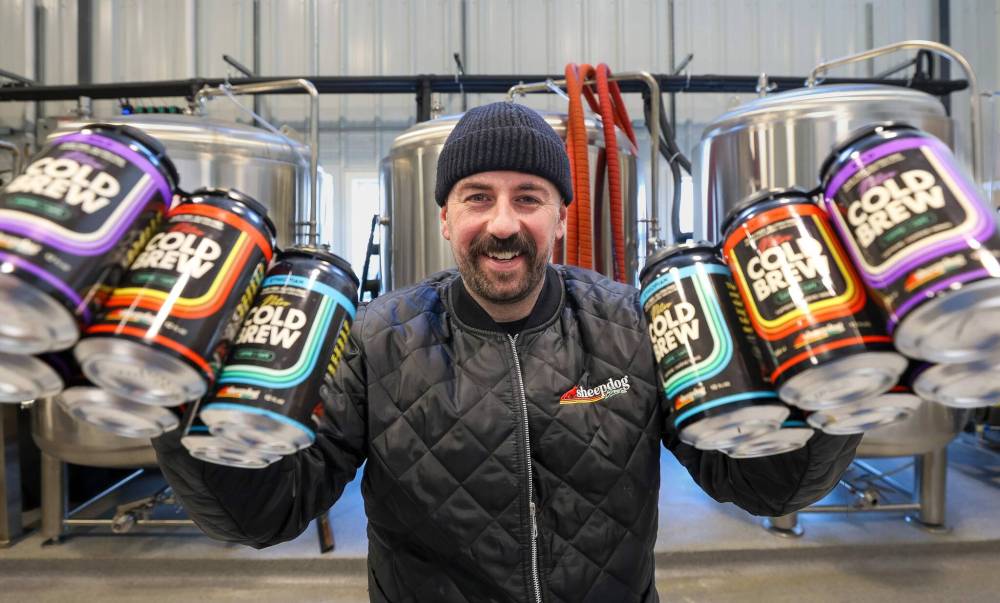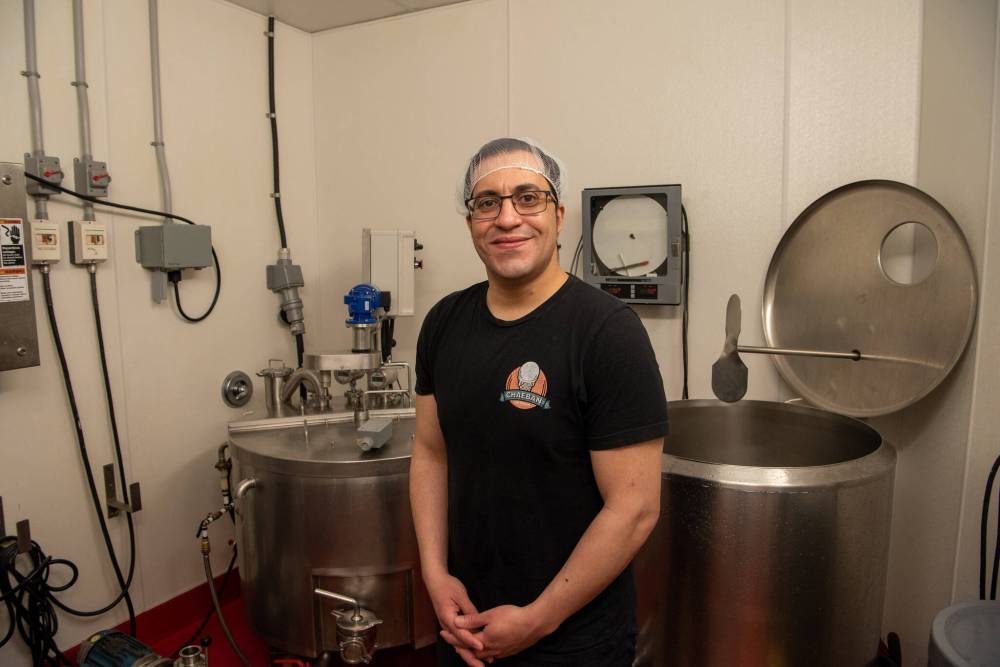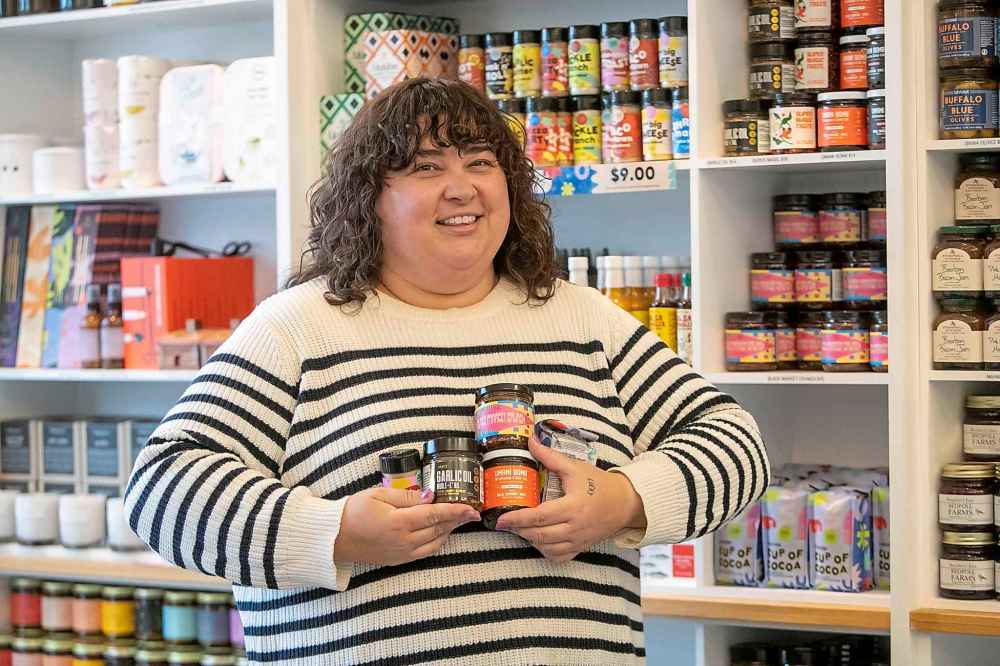‘Shop local’ rallying cry gains urgency
Manitoba food, beverage enterprises on front line of consumers’ shift as tariff clock ticks
Advertisement
Read this article for free:
or
Already have an account? Log in here »
To continue reading, please subscribe:
Monthly Digital Subscription
$0 for the first 4 weeks*
- Enjoy unlimited reading on winnipegfreepress.com
- Read the E-Edition, our digital replica newspaper
- Access News Break, our award-winning app
- Play interactive puzzles
*No charge for 4 weeks then price increases to the regular rate of $19.95 plus GST every four weeks. Offer available to new and qualified returning subscribers only. Cancel any time.
Monthly Digital Subscription
$4.99/week*
- Enjoy unlimited reading on winnipegfreepress.com
- Read the E-Edition, our digital replica newspaper
- Access News Break, our award-winning app
- Play interactive puzzles
*Billed as $19.95 plus GST every four weeks. Cancel any time.
To continue reading, please subscribe:
Add Free Press access to your Brandon Sun subscription for only an additional
$1 for the first 4 weeks*
*Your next subscription payment will increase by $1.00 and you will be charged $16.99 plus GST for four weeks. After four weeks, your payment will increase to $23.99 plus GST every four weeks.
Read unlimited articles for free today:
or
Already have an account? Log in here »
Hey there, time traveller!
This article was published 07/02/2025 (337 days ago), so information in it may no longer be current.
The ink is still drying on Sheepdog Brew Co.’s deal with Sobeys.
In a couple of weeks, drinks by the Oak Bluff-based coffee maker should be on the supermarket chain’s shelves. Meantime, Sheepdog is fielding more orders from established grocery clients. Take Red River Co-op: the chain’s Manitoba-made goods sales currently outpace its overall sales — it needs to keep up.
“There’s more urgency for … local,” said Shawn Black, founder of Sheepdog Brew. “(Retailers) want Canadian brands in the stores.”
MIKE DEAL / FREE PRESS Shawn Black, owner of Sheepdog Brew Co. (70 South Landing Dr.), is seeing more demand amid a “shop local” movement, including from retailers.
Many Manitoba enterprises say it’s too soon to determine whether the recent “shop local” movement is affecting their bottom lines. Already, though, parts of the grocery industry have been shifting to accommodate local demand.
Joseph Chaeban recently signed an agreement with Save-On-Foods to supply cheese from Chaeban Artisan, the company he’s grown in Winnipeg.
That’s another 200 stores come April, adding to the nearly 1,000 outlets across Western Canada now Chaeban Artisan stocks. The manufacturer’s Manitoba roots likely led Sobeys and Federated Co-op to sign on in past years, Chaeban believes.
U.S. President Donald Trump’s 25 per cent tariffs on a wide swath of Canadian goods — recently paused until at least March 4 — probably contributed to the Save-On-Foods deal, Chaeban continued.
“It’s actually working out pretty well in the local movement from these three big chains,” he said. “I’m very happy about that.”
Politicians have called for Canadians to shop local amid uncertainty over whether the U.S. will implement tariffs on Canadian imports. Stores are increasing locally-made signage; residents are circulating lists of homegrown products online. The Manitoba government announced Wednesday an advertising campaign to encourage local spending.
Chaeban, and entrepreneurs like him, hope the push persists. Chaeban is aiming for expansion.
ALEX LUPUL / FREE PRESS FILES Joseph Chaeban recently signed an agreement with Save-On-Foods to supply cheese from Chaeban Artisan.
So is Black, who intends to double Sheepdog Brew’s output this year. The company is rushing to get packaging equipment before tariffs may be implemented; Black plans to nearly double his staff by summer.
As the tariff clock continues to tick, Federated Co-operatives Ltd. — which Red River Co-op procures items through — is seeking alternatives to U.S. products.
“If (Canadian companies) lose any of their sales potential out of the U.S., then we’ll certainly be around to pick up that differential,” said Craig Gilpin, chief executive of Red River Co-op.
“I think we all have to work together to make sure that we continue a productive supply chain.”
Gilpin considers Red River Co-op’s future “very bright” because of its hyper-local focus. Roughly a quarter of the Manitoba-grown co-operative’s products are made in the province. It sold around $18 million in local goods last year.
Red River Co-op marks its Manitoba-made items. It will also make Mexican produce more identifiable in the coming weeks, Gilpin shared.
A renewed effort to shop local is still nascent; it’s hard to know what the full impact will be, said Robin Redstone, a senior manager at Gay Lea Foods Co-operative, which owns Bothwell Cheese.
Gay Lea sends bulk shipments to major retailers across Canada. It’s hearing “increased interest” from customers about Canadian-made products, but it will take time to see if that’s reflected in purchases, Redstone stated.
“I think we all have to work together to make sure that we continue a productive supply chain.”–Craig Gilpin, chief executive of Red River Co-op
Planet Pantry clients have been talking about Canadian-made items much more, echoed Sam Soloway, the company’s president.
She’s hopeful the trend will stay. However, she watched a similar boom during the COVID-19 pandemic from her perch in her eco-friendly household goods shop.
“Once restrictions weren’t really a thing anymore, everyone kind of went back to shopping online,” Soloway said. “You kind of hope (shopping local) sticks once people are a little bit more aware of the importance of it.”
Retailers will continue stocking Manitoba-made goods on shelves if they sell, said Barry Prentice, a University of Manitoba supply chain management professor.
Currently, national grocers may be providing local suppliers better deals on shelf space than in the past because of the political climate and consumers’ habits. Small businesses often bid against bigger competition for shelf space, Prentice explained.
“To the degree that (retailers) are wanting to encourage local producers, it’s a really good sign,” he said. “The reality is, we do have lots of good products here.”
Manufacturing — including food manufacturing — generates 10 per cent of Manitoba’s GDP. Shoppers’ “enthusiasm to buy locally” will affect the makeup of future grocery aisles, Prentice said.
Many businesses can’t swap U.S.-made goods for Canadian-made in an instant, noted Nicola Loewen, founder of Mad About Style.
BROOK JONES / FREE PRESS FILES Black Market Provisions co-owner Alana Fiks with local products.
And in several cases, there isn’t a similar Canadian alternative. Alana Fiks, co-owner of Black Market Provisions, worries she’ll have to stop selling Baggu brand reusable bags if a trade war commences.
Customers love the items and there’s no Canadian replacement of the same quality, Fiks said. The small portion of U.S. goods within Black Market Provisions come from ethical businesses, Fiks said.
“To not be able to support them is sad, but if our hands are tied, our hands are tied.”
There’s a question of manufacturing capacity when scouting locally, Prentice noted: chain retailers often expect a certain level of production when making deals, so local businesses must meet the economies of scale needed.
The proposed U.S. tariffs follow “hit after hit” against small businesses — for example, the COVID-19 pandemic and inflation, said Tyler Slobogian, Canadian Federation of Independent Business senior policy analyst for the Prairies and northern Canada.
The CFIB has publicized 66 cents of every dollar spent at a local business stays in the community, compared to 11 cents at a multinational corporation.
Cash spent at local businesses that don’t sell Canadian products still benefits the community because the revenue stays in the area, said Clinton Skibitzky, co-owner of Across the Board Game Café in Winnipeg.
gabrielle.piche@winnipegfreepress.com

Gabrielle Piché reports on business for the Free Press. She interned at the Free Press and worked for its sister outlet, Canstar Community News, before entering the business beat in 2021. Read more about Gabrielle.
Every piece of reporting Gabrielle produces is reviewed by an editing team before it is posted online or published in print — part of the Free Press‘s tradition, since 1872, of producing reliable independent journalism. Read more about Free Press’s history and mandate, and learn how our newsroom operates.
Our newsroom depends on a growing audience of readers to power our journalism. If you are not a paid reader, please consider becoming a subscriber.
Our newsroom depends on its audience of readers to power our journalism. Thank you for your support.









